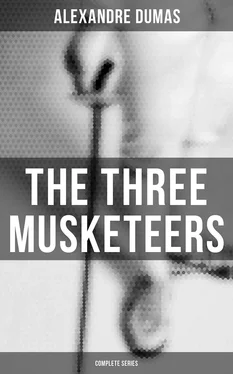“He was in the country, as I was told by the person who recommended him to me.”
“And who recommended this man to you?”
“The steward of the Duc de Grammont.”
“He is not a gossip, I hope?”
“Lord a mercy, my lord! I thought for a long time that he was dumb; he answers only by signs. It seems his former master accustomed him to that.”
“Well, dear Monsieur la Ramee,” replied the cardinal “let him prove a true and thankful keeper and we will shut our eyes upon his rural misdeeds and put on his back a uniform to make him respectable, and in the pockets of that uniform some pistoles to drink to the king’s health.”
Mazarin was large in promises,—quite unlike the virtuous Monsieur Grimaud so bepraised by La Ramee; for he said nothing and did much.
It was now nine o’clock. The cardinal, therefore, got up, perfumed himself, dressed, and went to the queen to tell her what had detained him. The queen, who was scarcely less afraid of Monsieur de Beaufort than the cardinal himself, and who was almost as superstitious as he was, made him repeat word for word all La Ramee’s praises of his deputy. Then, when the cardinal had ended:
“Alas, sir! why have we not a Grimaud near every prince?”
“Patience!” replied Mazarin, with his Italian smile; “that may happen one day; but in the meantime——”
“Well, in the meantime?”
“I shall still take precautions.”
And he wrote to D’Artagnan to hasten his return.
Chapter 17
Describes how the Duc de Beaufort amused his Leisure Hours in the Donjon of Vincennes.
Table of Contents
The captive who was the source of so much alarm to the cardinal and whose means of escape disturbed the repose of the whole court, was wholly unconscious of the terror he caused at the Palais Royal.
He had found himself so strictly guarded that he soon perceived the fruitlessness of any attempt at escape. His vengeance, therefore, consisted in coining curses on the head of Mazarin; he even tried to make some verses on him, but soon gave up the attempt, for Monsieur de Beaufort had not only not received from Heaven the gift of versifying, he had the greatest difficulty in expressing himself in prose.
The duke was the grandson of Henry VI. and Gabrielle d’Estrees—as good-natured, as brave, as proud, and above all, as Gascon as his ancestor, but less elaborately educated. After having been for some time after the death of Louis XIII. the favorite, the confidant, the first man, in short, at the court, he had been obliged to yield his place to Mazarin and so became the second in influence and favor; and eventually, as he was stupid enough to be vexed at this change of position, the queen had had him arrested and sent to Vincennes in charge of Guitant, who made his appearance in these pages in the beginning of this history and whom we shall see again. It is understood, of course, that when we say “the queen,” Mazarin is meant.
During the five years of this seclusion, which would have improved and matured the intellect of any other man, M. de Beaufort, had he not affected to brave the cardinal, despise princes, and walk alone without adherents or disciples, would either have regained his liberty or made partisans. But these considerations never occurred to the duke and every day the cardinal received fresh accounts of him which were as unpleasant as possible to the minister.
After having failed in poetry, Monsieur de Beaufort tried drawing. He drew portraits, with a piece of coal, of the cardinal; and as his talents did not enable him to produce a very good likeness, he wrote under the picture that there might be little doubt regarding the original: “Portrait of the Illustrious Coxcomb, Mazarin.” Monsieur de Chavigny, the governor of Vincennes, waited upon the duke to request that he would amuse himself in some other way, or that at all events, if he drew likenesses, he would not put mottoes underneath them. The next day the prisoner’s room was full of pictures and mottoes. Monsieur de Beaufort, in common with many other prisoners, was bent upon doing things that were prohibited; and the only resource the governor had was, one day when the duke was playing at tennis, to efface all these drawings, consisting chiefly of profiles. M. de Beaufort did not venture to draw the cardinal’s fat face.
The duke thanked Monsieur de Chavigny for having, as he said, cleaned his drawing-paper for him; he then divided the walls of his room into compartments and dedicated each of these compartments to some incident in Mazarin’s life. In one was depicted the “Illustrious Coxcomb” receiving a shower of blows from Cardinal Bentivoglio, whose servant he had been; another, the “Illustrious Mazarin” acting the part of Ignatius Loyola in a tragedy of that name; a third, the “Illustrious Mazarin” stealing the portfolio of prime minister from Monsieur de Chavigny, who had expected to have it; a fourth, the “Illustrious Coxcomb Mazarin” refusing to give Laporte, the young king’s valet, clean sheets, and saving that “it was quite enough for the king of France to have clean sheets every three months.”
The governor, of course, thought proper to threaten his prisoner that if he did not give up drawing such pictures he should be obliged to deprive him of all the means of amusing himself in that manner. To this Monsieur de Beaufort replied that since every opportunity of distinguishing himself in arms was taken from him, he wished to make himself celebrated in the arts; since he could not be a Bayard, he would become a Raphael or a Michael Angelo. Nevertheless, one day when Monsieur de Beaufort was walking in the meadow his fire was put out, his charcoal all removed, taken away; and thus his means of drawing utterly destroyed.
The poor duke swore, fell into a rage, yelled, and declared that they wished to starve him to death as they had starved the Marechal Ornano and the Grand Prior of Vendome; but he refused to promise that he would not make any more drawings and remained without any fire in the room all the winter.
His next act was to purchase a dog from one of his keepers. With this animal, which he called Pistache, he was often shut up for hours alone, superintending, as every one supposed, its education. At last, when Pistache was sufficiently well trained, Monsieur de Beaufort invited the governor and officers of Vincennes to attend a representation which he was going to have in his apartment.
The party assembled, the room was lighted with waxlights, and the prisoner, with a bit of plaster he had taken out of the wall of his room, had traced a long white line, representing a cord, on the floor. Pistache, on a signal from his master, placed himself on this line, raised himself on his hind paws, and holding in his front paws a wand with which clothes used to be beaten, he began to dance upon the line with as many contortions as a rope-dancer. Having been several times up and down it, he gave the wand back to his master and began without hesitation to perform the same evolutions over again.
The intelligent creature was received with loud applause.
The first part of the entertainment being concluded Pistache was desired to say what o’clock it was; he was shown Monsieur de Chavigny’s watch; it was then half-past six; the dog raised and dropped his paw six times; the seventh he let it remain upraised. Nothing could be better done; a sun-dial could not have shown the hour with greater precision.
Then the question was put to him who was the best jailer in all the prisons in France.
The dog performed three evolutions around the circle and laid himself, with the deepest respect, at the feet of Monsieur de Chavigny, who at first seemed inclined to like the joke and laughed long and loud, but a frown succeeded, and he bit his lips with vexation.
Читать дальше












